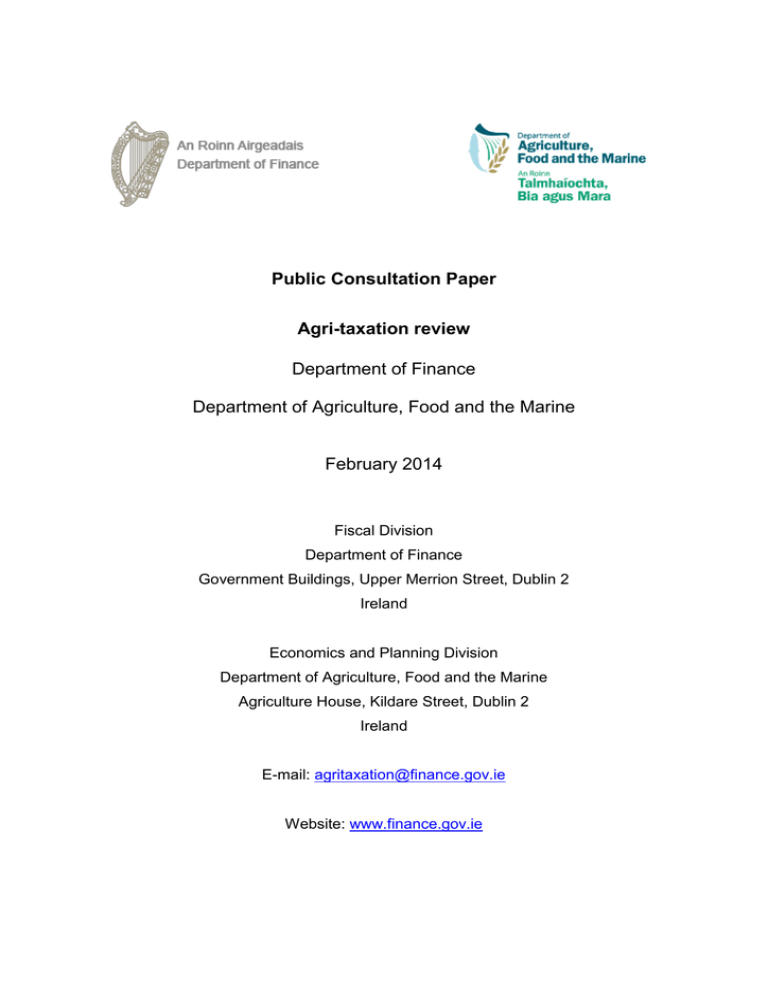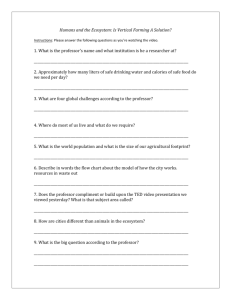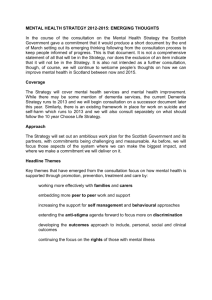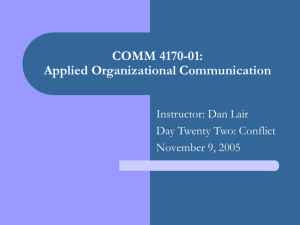Public Consultation Paper Agri-taxation review Department of Finance
advertisement

Public Consultation Paper Agri-taxation review Department of Finance Department of Agriculture, Food and the Marine February 2014 Fiscal Division Department of Finance Government Buildings, Upper Merrion Street, Dublin 2 Ireland Economics and Planning Division Department of Agriculture, Food and the Marine Agriculture House, Kildare Street, Dublin 2 Ireland E-mail: agritaxation@finance.gov.ie Website: www.finance.gov.ie Table of Contents Page No. 1. Introduction 3 2. The consultation process 4 3. Background 5 4. The consultation questions Annex A – Terms of Reference Agri-taxation review - Public Consultation Paper Department of Finance and Department of Agriculture, Food and the Marine 6-7 8 2 1. Introduction The Minister for Finance announced in his Budget speech, in conjunction with his colleague the Minister for Agriculture, Food and the Marine, that he would be commissioning a review of the tax reliefs available to the farming sector. This process will entail: (a) A cost benefit analysis (b) A public consultation. In order to focus the review it is intended that it will look at the primary sector only. This document represents the public consultation element of the review. For information, the general terms of reference for the review are set out in Annex A. The Department of Finance regularly reviews major tax expenditures. The purpose of this review will be to assess the costs and benefits of the various agricultural tax expenditures with a view to ensuring that the maximum benefit to the sector and the wider economy is obtained. There are a number of taxation expenditure measures which are exclusively aimed at the farming community. Farmers can also avail of a number of other measures which are not exclusive to the sector. The overall objective of the review is not to change the level of Exchequer support to the sector through the tax system but rather to maximise the benefits to the economy for the existing level of State support. Any recommendations will be considered in the context of Budget 2015 with particular reference to the Food Harvest 2020 Strategy. As Food Harvest 2020 is the basis for Government agriculture policy, the primary objective of agri-taxation reliefs is to incentivise farmers to deliver on its objectives of smart, green, growth. The Minister for Finance, Mr. Michael Noonan TD, and his colleague the Minister for Agriculture, Food and the Marine, Mr. Simon Coveney TD, are now launching the public consultation aspect of the review and interested parties are invited to make submissions. A list of questions is provided for guidance but additional tax policy issues of relevance to the primary agriculture and forestry sector are also welcome in order to enable both Departments to better understand the impact of Exchequer support through tax reliefs to the agricultural sector in Ireland. Agri-taxation review - Public Consultation Paper Department of Finance and Department of Agriculture, Food and the Marine 3 2. The Consultation Process Consultation Period The consultation period will run from Tuesday 11th February 2014 to Tuesday 25th March 2014, a period of 6 weeks. Any submissions received after this date cannot be considered. How to Respond The preferred means of response is by email to: agritaxation@finance.gov.ie. Alternatively, you may respond by post to: Agri-taxation review, Fiscal Division, Department of Finance, Government Buildings, Upper Merrion Street, Dublin 2. Please include contact details if you are responding by post. When responding, please indicate whether you are farming as a sole trader, incorporated, in a collaborative farming arrangement, a professional adviser, representative body or member of the public. Freedom of Information Responses to this consultation are subject to the provisions of the Freedom of Information Acts. Parties should also note that responses to the consultation may be published on the website of the Department of Finance. Meetings with key stakeholders The joint Department of Finance / Department of Agriculture, Food and the Marine (DAFM) working group may also invite key stakeholders to meet with them, including representative bodies, tax professionals dealing with the Agricultural sector and other interested groups or individuals. After the Consultation Tax policy issues from this public consultation, along with the outcome of the independent cost benefit analysis will form part of the Minister for Finance’s considerations in the context of Budget 2015. Agri-taxation review - Public Consultation Paper Department of Finance and Department of Agriculture, Food and the Marine 4 3. Background The agriculture sector is Ireland’s largest indigenous industry, which collectively employs about 167,0001 people. Bord Bia estimates that in 2013, the sector accounted for almost €10 billion in exports to over 160 export destinations. The stated Food Harvest 2020 goal is to increase this export value to €12 billion by 2020. According to the 2010 Census in Agriculture there are 139,860 farms in Ireland with an average farm size of 32.7 ha, and 99.8% were classified as family farms. A little over half of all farm holders in 2010 were aged 55 years or older, while just over a quarter of all farm holders were aged over 65 years. The number of holders aged less than 35 years represented just 6.2% of all holders in 2010. Farms in Ireland are quite fragmented with the average holding made up of 3.8 separate parcels. Specialist beef production is the dominant type of farming in Ireland with over 55% of farms. The average income on Irish farms in 2012 was almost €25,500. Within this, the relative profitability of the various sectors ranged from €49,000 for the dairy sector to an average of €12,000 for the cattle-rearing farms. An analysis of the NUTS III regions2 show the Border and West regions have the lowest average farm income at about €15,500 per farm. The Southeast has the most profitable farms with an average farm income of nearly €39,000, which is about two and half times the income per hectare of the Border and West regions. The wide variation in farm incomes is also underscored when national average incomes are compared for full and part-time farms in 2012. Fulltime farmers earned a little over €45,000, while part-time farmers’ incomes averaged about €12,000.3 The output from the primary agriculture sector has been estimated at €6.7 billion (at producer prices) with intermediate consumption estimated at almost €5.3 billion in 2012. Gross new investment in farming totalled €647 million in 2012, while the average borrowings per farm in 2012 were almost €24,000. More than any other industry, the economic benefits in the agri-food sector, both direct and indirect, are dispersed throughout the country making it particularly important to rural areas. Agriculture in relative terms is significantly more important to the BMW (Border, Midland, and West) region than the SE (South and East). 1 CSO QNHS data, Q3, 2013. There are eight NUTS III regions assigned by the EU for statistical purposes (Border, West, Midlands, Mid-east, Dublin, Southeast, Southwest and Mid-west). The BMW and SE are the two NUTS II regions. 3 The source for the income figures is the Teagasc National Farm Survey 2012. Agri-taxation review - Public Consultation Paper 5 Department of Finance and Department of Agriculture, Food and the Marine 2 4. The Consultation Questions In responding to this consultation you are invited to: Give your views on the specific questions set out below. You don’t have to answer every question – you can choose to answer any or all of the questions. Provide details of any alternative approaches or options you feel might be beneficial in dealing with the issues being addressed. Provide details of relevant issues not covered in this paper. If possible, provide some analysis of the Exchequer cost/yield of your preferred option. Comment generally on the direction you would like to see tax policy in this area develop. Your views are important as they may help influence the taxation treatment and policy to be applied in future to this sector. Question 1 What current agri-taxation measures are working effectively and why? Question 2 What current agri-taxation measures are not working effectively and why? Question 3 How could the tax system better influence activity in any of the key policy areas of : Encouraging and attracting young farmers and new entrants to farming Land mobility – transfers via the market, whether by sale or long-term leasing Succession – earlier lifetime transfers within families (and non-family transfers also where no apparent successor is available) Alternative farming models - collaborative farming such as farm partnerships, share farming, contract rearing or cow leasing; also farm business structure, i.e. sole trader or incorporation Environmental sustainability Smart Farming - encouraging innovation, improving skill levels and maximising the adoption of best practice. Question 4 Are there any other priority areas or future challenges that the tax system should seek to address? Agri-taxation review - Public Consultation Paper Department of Finance and Department of Agriculture, Food and the Marine 6 Question 5 Is there a high awareness of agri-taxation measures among a) farmers and b) professionals dealing with farmers; how can awareness of agri-taxation reliefs be raised? Consultation Period The consultation period will run from Tuesday 11th February 2014 to Tuesday 25th March 2014, a period of 6 weeks. Any submissions received after this date cannot be considered. How to Respond The preferred means of response is by email to: agritaxation@finance.gov.ie Alternatively, you may respond by post to: Agri-taxation review, Fiscal Division, Department of Finance, Government Buildings, Upper Merrion Street, Dublin 2. Please include contact details if you are responding by post. When responding, please indicate whether you are farming as a sole trader, incorporated, in a collaborative farming arrangement, a professional adviser, representative body or member of the public. Agri-taxation review - Public Consultation Paper Department of Finance and Department of Agriculture, Food and the Marine 7 Annex A – Overall Terms of Reference ‘The objective of the review is to identify what works and what doesn’t, and redirect the existing level of tax expenditure towards activities of maximum benefit to this sector of the economy.’4 The review will focus on the following general themes: Public consultation. Review the tax supports available to the primary agricultural sector in Ireland. Analyse the benefits available to the sector and the wider economy versus the Exchequer costs, i.e. value for money to the economy. Recommend, where necessary, changes that could be made to enhance or maximise the value for money to the tax payer, taking EU State Aid considerations into account. Suggest any improvements that can be made to better achieve existing stated policy goals, with particular reference to Food Harvest 2020 and the Programme for Government, the key policy areas being: Encouraging and attracting young farmers and new entrants to farming. Land mobility – transfers via the market, whether by sale or long-term leasing Succession – earlier lifetime transfers within families (and non-family transfers also where no apparent successor available) Alternative farming models - collaborative farming such as farm partnerships, share farming, contract rearing or cow leasing; also farm business structure, i.e. sole trader or incorporation Environmental sustainability Smart Farming - encouraging innovation, improving skill levels and maximising the adoption of best practice. Survey of accountants and tax professionals dealing with the primary agriculture sector. Benchmark of Irish agri-taxation policy measures against 3 other EU countries, such as, but not exclusively, the UK, France and the Netherlands. 4 Statement of the Minister For Finance, Budget 2014 Agri-taxation review - Public Consultation Paper Department of Finance and Department of Agriculture, Food and the Marine 8







